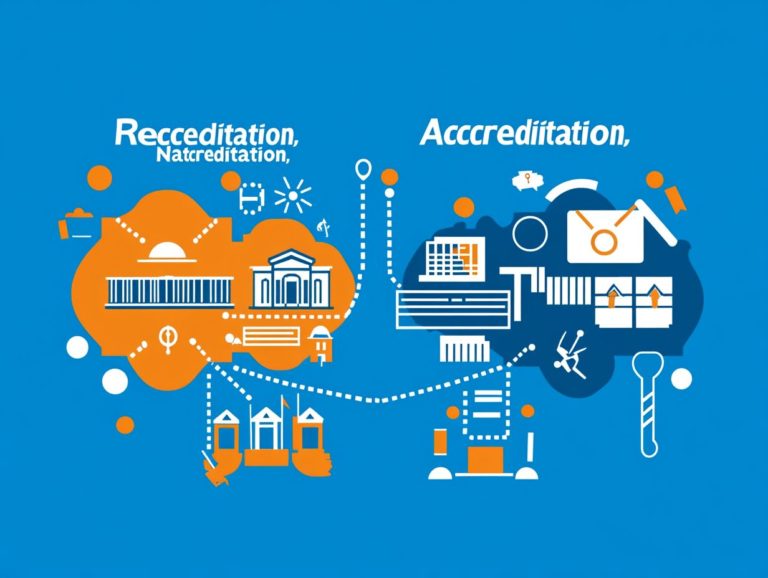How Accreditation Impacts Online Learning Experience
Navigating the realm of online education can feel quite overwhelming, especially when you re trying to understand the importance of accreditation. Accreditation is a seal of approval that ensures educational programs meet specific quality standards.
This article delves into what accreditation is and why it matters, highlighting its crucial role in online learning and the benefits it offers students.
Discover the challenges in this landscape and learn how to verify accreditation status while contemplating the future of online education.
Explore how accreditation can enhance your learning experience and pave your way to success.
Contents
- Key Takeaways:
- Why Accreditation Matters to You
- Accreditation and Online Learning
- Benefits of Accreditation for Online Learners
- Challenges of Accreditation in Online Learning
- Ensuring Accreditation for Online Programs
- Future of Accreditation in Online Education
- Frequently Asked Questions
- 1. How does accreditation impact the quality of the online learning experience?
- 2. Can I transfer credits from an accredited online learning program to a traditional university?
- 3. How does accreditation impact the job prospects of online learning graduates?
- 4. Is accreditation necessary for online learning programs?
- 5. Does the type of accreditation matter for online learning programs?
- 6. How can I check if an online learning program is accredited?
Key Takeaways:
- Accreditation ensures quality and recognition for your online education.
- Accredited programs allow easier credit transfers to traditional campuses.
- Always verify accreditation status to guarantee a valuable education.

Why Accreditation Matters to You
Accreditation plays a pivotal role in ensuring educational institutions uphold specific standards of quality and integrity, which is essential in today’s evolving landscape of online learning.
As distance education becomes increasingly prevalent, understanding the significance of accreditation agencies, such as the Western Association of Schools and Colleges and the Southern Association of Colleges and Schools, is crucial.
This process not only affirms the quality of the education you receive but also allows you, especially if you’re a first-generation student, to make informed decisions about your educational journey.
Definition and Importance
College accreditation is a vital quality assurance mechanism that confirms an institution’s adherence to educational standards and academic integrity. By navigating the rigorous evaluation process established by accreditation agencies, colleges demonstrate their commitment to delivering high-quality education.
This comprehensive review includes curriculum, faculty qualifications, student services, and institutional effectiveness. Various accreditation bodies, both regional and national, establish criteria that institutions must meet. Their oversight ensures that educational offerings remain relevant and robust, fostering trust among students, employers, and academic partners.
Ultimately, accreditation enhances the reputation of educational institutions and protects the interests of students investing in their futures.
Accreditation and Online Learning
Accreditation is vital in online learning, guaranteeing that educational programs through distance education meet established standards. Understanding the role of accreditation in online learning also assures the quality of your educational experience and enhances its overall value.
How Accreditation Applies to Online Education
Accreditation for online education guarantees that the programs you consider uphold the same educational standards as traditional institutions. Understanding the impact of accreditation on job opportunities involves considering key criteria such as curriculum quality, faculty qualifications, and student support services.
Accreditation bodies assess whether programs provide a comprehensive learning experience that emphasizes critical thinking and practical skills essential for your future employment.
Take, for example, institutions like the University of Phoenix and Southern New Hampshire University; their accreditation speaks volumes about their commitment to high educational standards.
The implications for you as a student are significant. Enrolling in an accredited program often leads to improved job prospects, eligibility for federal financial aid, and peace of mind that your education meets industry requirements.
Don t miss out on opportunities! Explore accredited programs today and unlock your potential!
Benefits of Accreditation for Online Learners

Accreditation presents a wealth of advantages for online learners. It assures the quality of educational content and elevates job placement opportunities. Additionally, understanding the future of accredited online education can provide insights into trends that enhance access to financial aid, which can greatly boost your academic and career prospects.
Quality Assurance and Recognition
Quality assurance is a cornerstone of accreditation. It ensures that accredited programs maintain high educational standards and academic integrity.
This process involves thorough evaluations against established criteria that cover everything from curriculum quality to faculty qualifications and student outcomes.
These standards show high-quality education and promote ongoing improvement within institutions. As a result, degrees from accredited programs are highly regarded by employers and educational entities, enhancing graduates’ job market prospects.
When employers see that a program is accredited, it indicates a commitment to quality. This influences hiring decisions and opens doors to further academic opportunities.
This reassurance reflects the true value of the education received, benefiting all stakeholders involved.
Transferability of Credits
One significant advantage of accredited programs is the seamless transfer of credits between institutions. This can greatly benefit you as you seek to further your education.
By enrolling in accredited institutions, your hard-earned credits are more likely to be recognized and accepted by other schools. This is crucial if you need to relocate or change your major.
Transferring credits from non-accredited institutions can be complicated, filled with potential setbacks.
Challenges often arise when attending non-accredited schools; you risk navigating complicated rules and processes that can cost you both time and money. Therefore, choosing accredited programs enhances your learning experience and ensures a smoother transition should you pursue further studies or explore new academic paths.
Challenges of Accreditation in Online Learning
Despite its significance, the accreditation process for online learning faces distinct challenges that can influence the educational experience.
These challenges include inconsistent standards among accreditation bodies and the swift advancement of learning technologies.
Unique Challenges and Solutions
As an accreditation body, evaluating distance education programs presents unique challenges that require innovative solutions to maintain educational quality.
With the rapid expansion of online learning platforms, you must navigate issues like inconsistent standards, varying levels of student engagement, and technological disparities that impact access and equity.
To tackle these complexities, implement comprehensive training for assessors that focuses on the specific nuances of online education.
Create adaptive evaluation frameworks that account for diverse teaching methodologies and learner outcomes to enhance your accreditation process.
Engage with technology experts to strengthen your assessments, providing valuable insights into the effectiveness of digital tools used to deliver course content.
Ensuring Accreditation for Online Programs

Act now to secure accreditation for your online programs! Your institution must actively engage in the accreditation process and regularly verify its accreditation status with recognized agencies.
Engaging with these bodies enhances your institution’s credibility and ensures that your programs meet the highest standards of quality and excellence.
How to Verify Accreditation Status
Checking the accreditation of your online program is a smart move! As a prospective student, it ensures that you enroll in programs that meet high-quality standards.
Taking the time to investigate this aspect can save you significant time and resources in the long run. Start by checking the program’s official website for accreditation information, which is often prominently displayed.
You can also visit the websites of recognized accreditation agencies to cross-reference details. Resources like the Council for Higher Education Accreditation (CHEA) and the U.S. Department of Education’s list of accredited institutions can be invaluable in your search.
It’s crucial to engage in this due diligence. Enrolling in a non-accredited program could negatively affect your future job prospects and eligibility for financial aid.
Future of Accreditation in Online Education
The future of accreditation in online education is on the brink of transformation. It is shaped by technological advancements and evolving student needs.
This evolution has the potential to bring about significant changes in how accreditation is approached and implemented, redefining standards and practices in the digital learning landscape.
Potential Changes and Impact on Students
Changes in the accreditation process could significantly impact your experience in distance education, highlighting the importance of knowing what to look for in an accredited online program, ultimately shaping your academic and professional future.
As these changes unfold, they may introduce new educational standards that could elevate the quality of programs. However, they could also result in a decline in the quality of institutions.
You might find yourself navigating a landscape where job placement rates vary widely, as employers may start to favor graduates from programs with stricter accreditation.
Your overall satisfaction could depend on how well your institution adapts to these shifts. This will ultimately influence your confidence in the value of your education and its relevance in the job market.
Frequently Asked Questions
-
1. How does accreditation impact the quality of the online learning experience?
Accreditation ensures that an online learning program meets certain educational standards. This includes factors such as qualified instructors, up-to-date curriculum, and adequate resources, which all contribute to a positive learning experience for students. Understanding why accreditation matters for online degrees is vital for prospective students.
-
2. Can I transfer credits from an accredited online learning program to a traditional university?
Yes, accredited online learning programs typically have their credits recognized by traditional universities. This allows for seamless credit transfers if you decide to continue your education at a different institution.
-
3. How does accreditation impact the job prospects of online learning graduates?
Accreditation adds credibility to an online learning program and the degree earned, which highlights the importance of choosing accredited online master’s programs. This can make a positive impression on potential employers and increase job prospects for graduates.
-
4. Is accreditation necessary for online learning programs?
Accreditation is not mandatory for online learning programs, but it is highly recommended. It helps ensure that the program meets certain standards and offers a quality education, highlighting why you should choose an accredited online program, which can benefit students in the long run.
-
5. Does the type of accreditation matter for online learning programs?
Yes, the type of accreditation can make a difference in the quality of an online learning program. Regional accreditation is generally considered more prestigious and recognized by more institutions than national accreditation.
-
6. How can I check if an online learning program is accredited?
You can check the accreditation status of an online learning program by researching the accrediting agency and checking their database. You can also look for the program’s accreditation status on their website or by contacting the institution directly.







